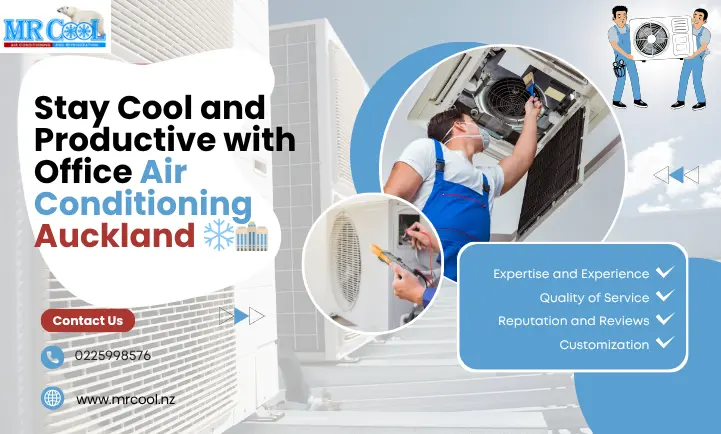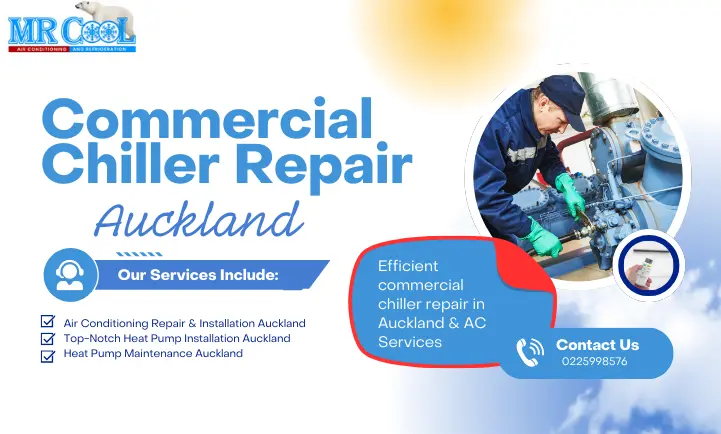Auckland’s weather Autumn in Auckland Auckland has a subtropical climate with warm, humid summers and mild, damp winters. Temperature control in the office. Keeping a steady work environment is not just for comfort, it’s about productivity, equipment performance and employee health. Which is why Office Air Conditioning Auckland is a significant subject for business owners, property managers and commercial renters.

In this post, we discuss what to look for in an effective office air conditioning solution, how to decide which option is best for your working environment, and the place of new cooling technologies, like Commercial Cooling Auckland systems and Industrial Chiller Units Auckland. The aim is to give you useful, specific advice which will make it easier for you to make informed choices about cooling your office space in Auckland.
Understanding the Role of Air Conditioning in Office Environments
Office air conditioning does more than simply cool the air. It is the key for controlling humidity, increasing the indoor air quality and keeping all workstations at a balanced temperature. In locations such as Auckland, where summer humidity can easily soar, air conditioning is no longer something that you can take or leave.
Air Conditioning Auckland for the Office. An effective Office Air Conditioning Auckland system is important for employees’ health and comfort. It’s preventing fatigue, headaches, and low productivity from the temperature not having the settings it needs. Now that the temperatures are cooler in more workplaces and there is more heat-producing machinery, such as services and computers, effective air conditioning can also stop overheating, which can mess up equipment and put data at risk.
Choosing the Right Office Air Conditioning System Auckland
The dimensions, structure and function of your office space also have an impact on the performance of the air conditioning system that you need. For instance,a one-level open-plan office may need a ducted or VRF system, yet a multi-storey building would need a mixture of rooftop units and zone-controlled systems.
When selecting a system, consider the following:
- Capacity: The system must be able to handle the cooling load based on square footage and occupancy.
- Energy Efficiency: Look for units with a high Energy Efficiency Ratio (EER) or Seasonal Energy Efficiency Ratio (SEER).
- Noise Levels: In quiet office settings, low-noise systems are a must.
- Zoning Capabilities: This allows different temperature settings in different parts of the building.
Proper sizing is essential. A/the system that is too small will have inadequate capacity to cool the room/space, too large will cool too quickly and not dehumidify the area, leading to a cool, clammy, uncomfortable environment.
We here at Mr. Cool frequently assist our clients in determining their cooling requirements by visiting the site, running load calculations, and looking at the existing infrastructure. Expertise during the planning phase can save a substantial amount in operating costs and maintenance.
Common Types of Office Air Conditioning Systems
Auckland companies have the convenience of a variety of cooling options, catering to offices of all shapes and sizes:
1. Split and Multi-Split Systems
These are the favourites for small to medium offices. One outdoor unit can drive one (split) or multiple (multi-split) indoor units. They’re also less expensive to install and can work in homes where no ductwork exists
2. Ducted Systems
Larger offices can benefit from ducted systems offering flowing cooling. They provide centralised temperature control and are usually concealed in the ceiling cavity to hide them from view.
3. VRF/VRV Systems
These are more sophisticated multi-zone systems that use inverter technology to adjust refrigerant flow to individual zones and are suitable for combination office spaces with different zones of occupancy or use.
4. Industrial Chiller Units Auckland
These workhorses are often found on factory floors, but they can also tackle big commercial office buildings. The chillers take heat from water that has been used to air-handles or cartridges, and this allows for a uniform cooling room.
The Importance of Commercial Cooling Design and Integration
Commercial Cooling Auckland systems are complicated structures that need a professional design and should ideally be integrated into the office infrastructure. The effectiveness of any system will also depend upon the units themselves, as well as the insulation in the building, the configuration of the space, and the placement of vents and thermostats.
Some important design considerations include:
- Airflow Distribution: Bad air distribution can cause pockets of warm and cold air and can mean less comfort and higher energy bills.
- Ventilation: With modern office buildings, ventilating abilities have to be compensated for cooling. HRVs and ERVs are other systems that can help improve IAQ.
- Integration with Smart Controls: A lot of new commercial office ac units are compatible with smart thermostats, allowing remote control, programmable scheduling and reading of usage patterns.
For businesses looking to install Office Air Conditioning Auckland, it’s really important to deal with experts who are familiar with local building codes, energy needs and climate factors. This is so that the system is not only compliant but also performs optimally.
Maintenance and Operational Considerations
After having your air conditioner system installed, regular maintenance is essential to the long-term efficiency of your system. Treated well, systems can continue to deliver up to 95% of their original performance per annum.
Basic maintenance tasks include:
- Cleaning or replacing air filters
- Inspecting and cleaning the condenser and evaporator coils
- Checking refrigerant levels
- Ensuring thermostats are calibrated correctly
- Inspecting ducts for leaks or blockages
Regular professional checking of larger systems, like Industrial Chiller Units Auckland, is necessary. These systems are frequently included in modelling a building’s central plant and affect cooling as well as heating. Inadequately cared-for chiller systems become hourly energy hogs and a likely candidate for early replacement.
Energy Efficiency and Environmental Impact
In Auckland, the impending impact of environmental concerns, companies wishing to reduce carbon footprints and reduce operating costs, are searching for creative energy solutions. Modern Office Air Conditioning Auckland systems can be designed with energy recovery features, high-efficiency compressors, and inverter technology.
Additional strategies to improve energy performance include:
- Installing programmable thermostats to optimise schedules
- Using occupancy sensors to reduce usage in empty rooms
- Upgrading insulation to reduce thermal losses
- Installing double-glazed windows to improve building envelope efficiency
It might also be a good idea to look for government rebates or programs that support energy-efficient HVAC options. And some commercial properties could qualify for energy ratings or certifications to show their lower energy use and operationally sustainable performance.
When to Consider an Upgrade
Older systems become inefficient and expensive to operate, even with regular upkeep. You might need a new air conditioning unit if… If you’ve had your office AC system for more than 10–15 years, and you notice:
- Uneven temperatures across zones
- Rising energy bills
- Frequent repairs
- Poor humidity control
Upgrade An ageing system will mean an old system of comfort – and a high energy bill. The new systems are also quieter, are easier to control and are better at managing the widely fluctuating loads common in office buildings.
With regard to buildings that operate Industrial Chiller Units Auckland, system audits can ascertain when retrofit or replacement would provide improved performance. Thanks to the advanced control systems and improved Coefficient of Performance (COP), the chillers are also ideal for future-compatible office buildings.
Planning for the Future
Auckland’s economy is expanding, and so is the need for energy-efficient air conditioning in offices. Offices that anticipate future growth—by investing in scalable and flexible systems—will be better prepared for future expansion, occupancy churn, or remote work flexibility.
When it comes to shifting into a new commercial premises or upgrading your existing setup, getting proactive with your office air conditioning Auckland system upfront can ensure you avoid expensive mistakes. Get advice from engineers or HVAC experts early on, especially if you are getting ready to fit out a building or renovate it. They can assist with coordinating ductwork, loads and airflow design with architects and contractors.
Summary
You can never overestimate the value of a good Office Air Conditioning Auckland system. It helps as well with productivity, and it ensures that sensitive equipment is safe, but it’s also used to maintain a healthy work environment. These various systems will be suitable in office buildings, depending on your layout, cooling load, energy targets and future expansion.
Whether traditional Split Systems, ducted units, or large-scale Industrial Chiller Units Auckland planning and installation need to be expertly carried out. If handled in the right manner, commercial cooling systems Auckland will be an asset and not an expense, providing comfort and energy efficiency throughout the seasons.
“We focus on creating custom solutions for Auckland businesses throughout the entire cycle—from designing and installing right through to ongoing care. If you are a business owner looking to provide reliable and well-engineered climate control, then investing in a good, solid Office Air Conditioning Auckland is investing in the future of your people and the money you could lose due to time off work.


